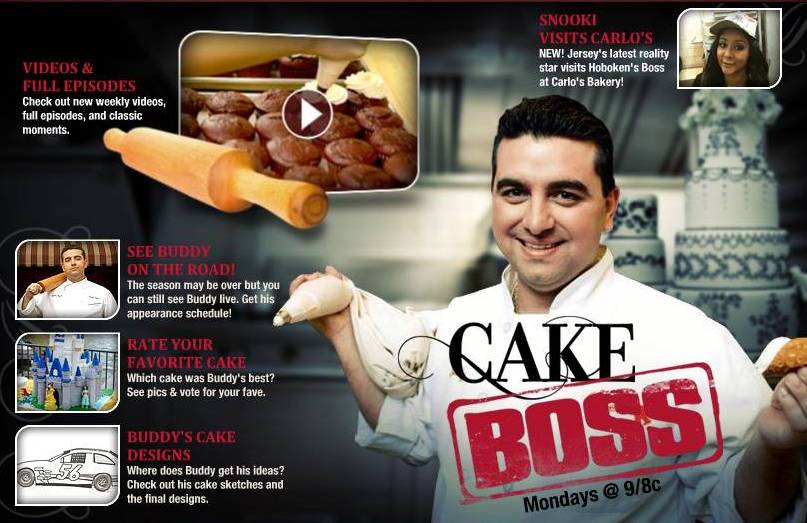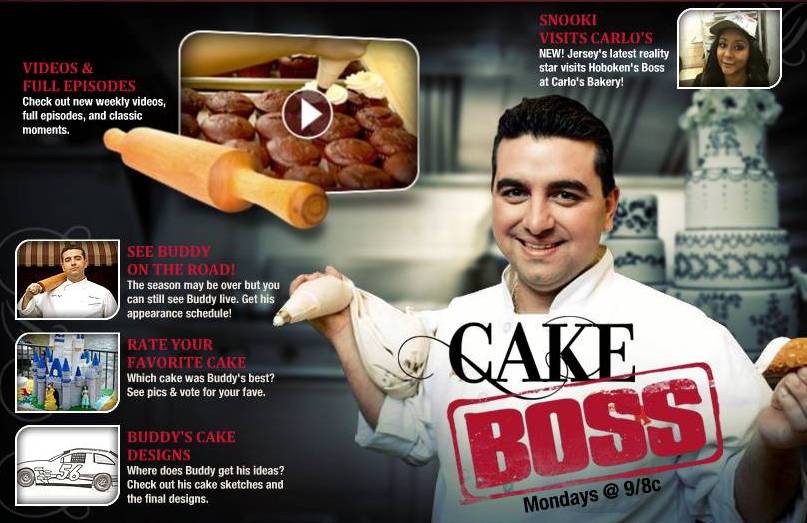Entries in Trademark Infringement (368)
Settlement Allows The Learning Channel to Continue Using "Cake Boss" Name
 Settlement: TLC can continue using the “Cake Boss” name after all
Settlement: TLC can continue using the “Cake Boss” name after all
I had envisioned writing a little about trademarks in China, but that will have to wait.
Back from vacation, I was greeted this morning with news that the “Cake Boss” case has settled. (See STL posts on the case here, here and here.)
Terms are unknown — at least to me — but the press says the producers of The Learning Channel’s popular television show can continue to use its “Cake Boss” name, which the Western District previously had enjoined.
The settlement undoubtedly will result in the dismissal of the case.
It also presumably resulted in money changing hands.
Masters Software brought the case in March on claim the TV show’s use infringed its registered trademark in CAKEBOSS in connection with software.
The case cite is Masters Software, Inc. v. Discovery Communications, Inc., No. 10-405 (W.D. Wash.).
No Commerical Interest Means No Standing, Seventh Circuit Says
Someone with a little too much time on her hands Yahooed! herself.
To her dismay, the search results linked to Web sites and ads that the searcher found “shameful.”
So Beverly Stayart did the natural thing a person with too much time (and worse yet) too much money would do.
She sued Yahoo!
Well, the Eastern District of Wisconsin dismissed her claims.
So she appealed.
On Sept. 30, the Seventh Circuit affirmed, finding Ms. Stayart lacked standing to assert her claims because she does not have a commercial interest in her name.
Ms. Stayart argued that her political activities involving advocacy and boycotts constitutes “services” and “commercial activities.”
The Seventh Circuit found otherwise.
“Relying on cases in other circuits, Stayart argues that because her activities include advocacy and boycotts she is engaged in ‘services’ and ‘commercial activities’ and therefore has standing to pursue her claim. In support of this position, she cites to a case from the Second Circuit in United We Stand Am., Inc. v. United We Stand, Am. NY, Inc., 128 F.3d 86, 89 (2d Cir. 1997) that discusses non-profit groups that engage in ‘service’ and that affect ‘commerce.’ The problem with that argument is that United We Stand was brought under a different section of the Lanham Act, 15 U.S.C. 1114(1)(a) or, as it is otherwise known, § 32 of the Lanham Act. That section and its language are distinct from § 43. Specifically, § 32 gives ‘[n]onprofit and charitable corporations … the same protection against confusing use of their names as is given to business corporations. But unlike § 43, § 32 requires that a plaintiff seeking protection have ‘a registered mark.’ Stayart has not raised a claim under § 32, and even if she had, it would still fail because she does not claim that her name is a registered trademark. Therefore, United We Stand is inapplicable and Stayart’s activities do not give her standing under § 43.”
The case cite is Stayart v. Yahoo! Inc., __ F.3d __, 2010 WL 3785147, No. 09-3379 (7th Cir. Sept. 30, 2010).
Uwajimaya Sues Over "Waji's" Trademark Filings
 The Waji’s concession at Seatac. (Photo from defendant’s Web site)
The Waji’s concession at Seatac. (Photo from defendant’s Web site)
Who’s entitled to register WAJI’S?
Plaintiff Uwajimaya, Inc., says it’s the only one who is. On Sept. 14, it filed suit in the Western District against Concourse Concessions, LLC, to establish that point.
The Seattle-based Asian grocer leased space at the Seatac International Airport for the purpose of selling food and beverage concessions. It alleges it subleased part of its space to Concourse with the understanding that Concourse would develop a concession concept using Uwajimaya’s brand.
 The complaint states in 2007 Concourse opened a restaurant called “Waji’s by Uwajimaya,” which serves ready-to-eat Asian foods. Uwajimaya alleges it suggested the name because customers often shorten Uwajimaya to “Waji’s.” It alleges it granted Concourse an oral license to use its mark with the understanding that the agreement would be reduced to writing. Uwajimaya says it never was.
The complaint states in 2007 Concourse opened a restaurant called “Waji’s by Uwajimaya,” which serves ready-to-eat Asian foods. Uwajimaya alleges it suggested the name because customers often shorten Uwajimaya to “Waji’s.” It alleges it granted Concourse an oral license to use its mark with the understanding that the agreement would be reduced to writing. Uwajimaya says it never was.
The complaint says in 2009, Concourse filed a number of federal applications to register trademarks including the terms WAJI’S and UWAJIMAYA, claiming to be the owner of those marks. One of the applications has matured to registration.
Uwajimaya says it attempted to negotiate an assignment of Concourse’s filings but its efforts failed. It claims it has terminated its oral license agreement.
Uwajimaya alleges claims for trademark infringement, false designation of origin, violation of Washington’s anti-dilution statue, and fraudulent registration.
Concourse has not yet filed an answer.
The case cite is Uwajimaya, Inc. v. Concourse Concessions, LLC, No. 10-1474 (W.D. Wash.).
Western District Grants TRO Against Trademark Infringement Plaintiff
Medical Communications Resources, Inc., sued Global Initiative for Asthma, Inc. (GINA), and Global Initiative for Chronic Lung Disease, Inc. (GOLD) in the Western District for trademark infringement, among other claims.
GINA and GOLD counterclaimed for breach of contract and moved for a temporary restraining order.
In doing so, GINA and GOLD alleged that contracts with Medical Communications gave them the right to use and control their logos and to control their Web sites. GINA and GOLD claimed that Medical Communications breached the contracts by blocking control of their Web sites and threatening their use of certain intellectual property, among other things.
Medical Communications did not respond.
On Sept. 2, Western District Judge Benjamin Settle granted the motion. The court ordered Medical Communications to restore GINA’s and GOLD’s access to their Web sites and not to interfere with their operations. It also scheduled a preliminary injunction hearing for Oct. 15.
On Sept. 8, the parties informed the court they had agreed to resolve some of the issues in dispute. In response, the court vacated the TRO and ordered the parties to continue to try to resolve the issues that remained.
The case cite is Medical Communications Resources, Inc. v. Global Initiative for Asthma, Inc., No. 10-5541 (W.D. Wash. Sept. 2, 2010) (Settle, J.).
Western District Denies Cake Boss Star's Motion to Dismiss
 “Cake Boss” star Buddy Valastro
“Cake Boss” star Buddy Valastro
Buddy Valastro remains in the mix.
On Sept. 3, the Western District denied “Cake Boss” star Bartolo Valastro’s motion to dismiss Masters Software, Inc.’s claims against him for lack of personal jurisdiction and for failure to state a claim. (For background on the software company’s trademark infringement case over the TV show’s use of “Cake Boss,” see STL’s last post on the case here.)
In short, Western District Judge Richard Jones found Mr. Valastro’s efforts to promote his upcoming tour stop in Seattle subjected himself to the court’s jurisdiction.
“Mr. Valastro attempts to shift attention away from his Tour stop in Seattle by arguing that it will not occur until November,” the court found. “Typically, only a defendant’s contacts leading up to litigation are relevant in personal jurisdiction analysis. In this case, however, it is not Mr. Valastro’s upcoming appearance on which the court focuses, but rather on his efforts to promote that appearance and sell tickets via the Tour Website. The Tour Website offered tickets for sale to all tour shows at least as early as June 28, 2010, the date on which Masters filed its opposition to the instant motion. Masters filed its amended complaint on May 21, 2010, and absent evidence from Mr. Valastro to the contrary, the court assumes that the Tour Website was online at that time as well. This is not an unreasonable assumption, given that the first show that the Tour Website promotes was in Pennsylvania on June 23, 2010.”
The court added: “Masters’ evidence gives rise to an uncontroverted inference that Mr. Valastro or his designee has intentionally targeted Washington residents for the sale of tickets to his Tour appearance in Seattle in November. As the court has noted, Mr. Valastro provides no evidence regarding the Tour or the Tour Website, other than to note that another entity claims a copyright in the Tour Website and credit for producing the Tour. Mr. Valastro does not, however, contend that he is merely a pawn, appearing in the Tour solely at the bidding of some unnamed master. Mr. Valastro’s participation in a Tour (and a Seattle Tour stop) focused entirely on him and his Cake Boss persona gives rise to an inference that Mr. Valastro himself has intentionally targeted Washington. Mr. Valastro offers no evidence to the contrary.”
The court gave three reasons why Masters had stated a claim against him.
“First, Masters has plainly stated a claim based on Mr. Valastro’s activities in promoting the Tour, as the court has already discussed.
“Second, contrary to Mr. Valastro’s contentions, Masters has alleged sufficient facts from which a jury could find Mr. Valastro personally liable for harm arising out of the airing of Cake Boss. Mr. Valastro asserts, in essence, that he cannot be personally liable for Discovery’s [the television network’s] actions. The complaint, however, alleges two facts inconsistent with this assertion. First, it alleges what this court has already noted, Mr. Valastro is not merely a pawn in Discovery’s promotion of Cake Boss, he is the star of the show. Second, in his capacity as star of the show, Mr. Valastro represented to Masters in March 2009 that he had the power to influence Discovery’s decisions with respect to the show’s name. These allegations are sufficient, at the pleading stage, to state a claim against Mr. Valastro.
“Third, Mr. Valastro argues that Masters does not state a tortious interference claim against him. That claim is based on allegations that Mr. Valastro personally contacted a bakeware supplier with whom Masters had contracted and threatened that TLC would take legal action if the supplier did not cease the sale of CakeBoss-branded bakeware. Mr. Valastro suggests that he was acting on TLC’s behalf, not his own. Mr. Valastro is free to make that factual argument to a jury. It is insufficient as a basis for a motion to dismiss.”
The case cite is Masters Software, Inc. v. Discovery Communications, Inc., No. 10-0405 (W.D. Wash. Sept. 3, 2010) (Jones, J.).